Florak Surname Ancestry ResultsOur indexes 1000-1999 include entries for the spelling 'florak'. In the period you have requested, we have the following 5 records (displaying 1 to 5): Buy all | | | Get all 5 records to view, to save and print for £18.00 |
These sample scans are from the original record. You will get scans of the full pages or articles where the surname you searched for has been found. Your web browser may prevent the sample windows from opening; in this case please change your browser settings to allow pop-up windows from this site. Chancery Warrants
(1244-1326)
Warrants were issued by the kings of England to the royal chancery: most of these warrants led to further proceedings which are recorded on the Charter Rolls, Patent Rolls, Fine Rolls, Close Rolls or the Inquisitions: but archivists have identified a large number of warrants for which there are no such equivalent records, and those for the reigns of Edward I and Edward II are gathered here. Most of the entries relate to England and Wales, but with occasional items referring to Ireland and the English possessions in France.FLORAK. Cost: £4.00.  | Sample scan, click to enlarge

| Wiltshire Feet of Fines
(1273-1326)
Pedes Finium - law suits, or pretended suits, putting on record the ownership of land in Wiltshire. These abstracts were prepared by R. B. Pugh for the Wiltshire Archaeological and Natural History Society Records Branch and published in 1939, under the title 'Abstracts of Feet of Fines relating to Wiltshire for the Reigns of Edward I and Edward II'. Pugh made abstracts not only of the Wiltshire feet of fines for the two reigns but also of the Wiltshire content of those feet of fines covering two or more counties, which are archived separately under 'Divers Counties'. Each entry starts with a sequential number within the regnal year. The date then given is the date on which the original writ was returnable in court, rather than the date on which proceedings were completed. The dates do not fall on the quarter days themselves (Michaelmas, Hilary, Easter and Trinity) but on the octave (oct., 7 days after), quindene (quin., 14 days after), or three weeks later, &c. Then there is the name of the party initiating the action (X: pl., plaintiff, or dem., demandant), and then that of the defendant (def.) or impedient (imp.) (Y). Then there is a summary description of the land involved; and then a code indicating the precise nature of the action. Seven of these (A. to G.) are variants on the theme of X having acknowledged the premises to be the right of Y; but H. indicates a simple complete grant from X to Y, complete with actual transfer of possession. In cases B., C., E. and G. it is X, not Y, on whom the property is settled. If there is a warranty clause, or a more involved settlement, the details are given.FLORAK. Cost: £4.00.  | Sample scan, click to enlarge

| Grantees of offices, commissions and pardons
(1350-1354)
The Patent Rolls are the Chancery enrolments of royal letters patent. Those for the 24th to the 27th years of the reign of king Edward III (25 January 1350 to 24 January 1354) were edited for the Public Record Office by R. F. Isaacson, and published in 1907. The main contents are royal commissions and grants; ratifications of ecclesiastical estates; writs of aid to royal servants and purveyors; and pardons. FLORAK. Cost: £2.00.  | Sample scan, click to enlarge

| Clergy, the religious and the faithful in Britain and Ireland
(1342-1362)
These are abstracts of the entries relating to Great Britain and Ireland from the Regesta of popes Clement VI and Innocent VI, from the period when the papal court was resident at Avignon. Many of these entries relate to clerical appointments and disputes, but there are also indults to devout laymen and women for portable altars, remission of sins, &c. This source is particularly valuable for Ireland, for which many of the key government records of this period are lost. Clement VI was consecrated and crowned 19 May 1342 (the day from which his pontificate is dated); Innocent VI was crowned 18 December 1352 and died 12 September 1362. The extracts were made by W. H. Bliss and C. Johnson from Regesta cxxxvii to ccxliv, and published in 1897. The registers are almost complete for these two pontificates. At his accession, Clement VI promised to grant benefices to all poor clerks who should come to Avignon and claim them within two months of his coronation. As many as 100,000 are said to have come, and the register for the first year of his pontificate runs to twelve volumes.FLORAK. Cost: £4.00.  | Sample scan, click to enlarge

| Payments by the English crown
(1370)
The Exitus or Issue Roll of the Exchequer, compiled by the Clerk of the Pell, recorded all issues or payments made by the English crown: presents of plate and jewellery to foreign nobility; household payments to officers and servants; wardrobe payments; alms; payments for the upkeep of royal palaces, manors, residences and chapels; repayments of loans to the king; payments to messengers and couriers; wages of mercenaries; the upkeep of the navy; ransoming of hostages; maintenance of castles, forts, garrisons and fortifications; salaries of judges and other officers of the courts of Chancery, Exchequer, King's Bench and Common Pleas; as well as a host of miscellaneous other items. This is a translation of the text of the roll for the 44th year of the reign of king Edward III, when Thomas de Brantingham, Bishop of Exeter, was Lord High Treasurer of England.
FLORAK. Cost: £4.00.  | Sample scan, click to enlarge

|
Research your ancestry, family history, genealogy and one-name study by direct access to original records and archives indexed by surname.
|







